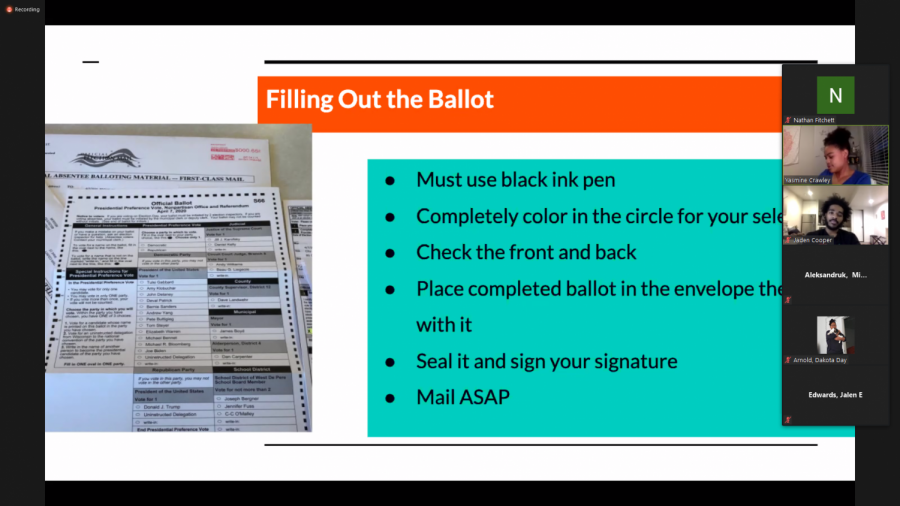‘Put our vote where our mouth is’: Black Senate hosts voter registration workshop
The Black senate hosted the Thursday night workshop in hopes of better engaging Pitt’s Black student population in the upcoming Nov. 3 election.
October 9, 2020
Destiny Mann, president of the Black Senate and vice president of the Black Action Society, urged students at a virtual voter registration workshop to make their voices heard come election day.
“This is a right that we are guaranteed, but we weren’t always guaranteed, so we need to be taking advantage of it,” Mann, a junior Africana Studies and political science double major said. “Please go vote, vote early if you can, vote in person if you can.”
The Black Senate hosted the Thursday night Zoom workshop called “Project: VOTE” to engage Pitt’s Black student population in the upcoming Nov. 3 election. They provided free instruction on how to successfully complete an absentee ballot and mail in ballot as well as tips on voter registration. They also discussed the importance of Black voters’ voices in the election.
Nana Gyabaah-Kessie, a presenter at the event and president of the African Students Organization, said the Black vote in America can have a huge impact in modern elections’ results.
“Within the 21st century we are seeing how impactful the Black vote is, and seeing how much impact we have within the United States,” Gyabaah-Kessie, a senior molecular biology major, said. “I think it’s more important than ever that we go out there and take this opportunity to make a change, and put our vote where our mouth is.”
The event featured a presentation by Morgan Ottley, the president of the Black Action Society, on the importance of voting in America and the history of voting rights in the country. Ottley, a senior neuroscience major, focused on how the Black vote had been historically suppressed in America, even after being granted constitutional protections.
Gyabaah-Kessie said the Black community knows how difficult it was to attain their right to vote. Black people in the US have experienced numerous examples of voter suppression including poll taxes and literacy tests, as well as the more recent voter ID laws.
“As Black citizens in the US, we know that once upon a time we did not have this opportunity to go out and freely vote as citizens,” Gyabaah-Kessie said. “That right was simply not given to us because we were Black and because we were deemed as different from the founders of this country,”
Presenters also split the call up into breakout rooms to give hands-on demonstrations on voter registration, absentee voting and mail-in voting. Presenters walked participants through the different processes step-by-step and gave specific advice on how to make sure their vote was counted on election day. They gave common problems such as signature verification and ballot requesting special attention.
Yasmine Crawley, another presenter for the event and member of the Black Senate’s Board of Presidents, said the Black Senate wants to make sure that they were thorough in the information they provided.
“Voting has been suppressed in our community, historically,” Crawley, a senior psychology and Africana studies major, said. “So we wanted to do anything we can to make it easier for people to know how to vote, where to go, what their options were and to make sure it’s clear across the board.”
Ottley also spent time going over the different candidates that were up for election, at both a local and national level. She did not make any suggestions to participants as to which candidates they should vote for, but rather emphasized the importance of being an informed voter.
“Please do not vote willy-nilly,” Ottley said. “This is very important as the offices up for election this year are running for pretty long terms, and can have a major impact on your daily life.”
Gyabaah-Kessie said since 100 million voters neglected to vote in the 2016 election, people need to vote if they want to see a different result this election.
“How can you sit back and say ‘Oh I want to make change,’ when you don’t go out and do one of the most amazing things you could do, which is voting,” Gyabaah-Kessie said. “Whatever we want to see changed, we need to go out there and vote for that change to happen.”



